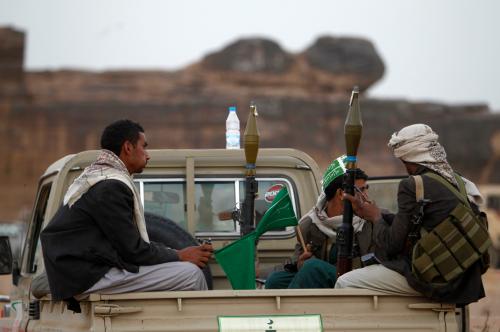Secretary of Defense Robert Gates came into office wanting to close the American detention operation at Guantanamo Bay, Cuba. Nearly two years later, Guantanamo is still there. Secretary of State Condoleezza Rice has said she wants to close it. Guantanamo will outlast her. Yet, to watch the post-election Democratic triumphalism, you’d think that Guantanamo is as good as shuttered. President-elect Barack Obama has reiterated his campaign promise to close it, and some self-described advisers talk as though he’ll wave a magic wand on Jan. 20 and a problem that has bedeviled this country for seven years will evaporate.
Closing Guantanamo won’t be easy, at least not if Obama means to change the substance of American detention policy rather than merely altering its geography. Obama could, to be sure, fulfill his promise simply by moving detainees to a different facility while continuing to hold them as “enemy combatants.” The challenge of closing Guantanamo would then come down to a series of logistical and administrative questions.
Solving the Guantanamo problem means making important decisions about detention policy in combating terrorism more generally: When, if ever, should the United States engage in preventive detention of terrorism suspects? If and when it does, should it treat them as enemy combatants under the laws of war or under some other body of law, perhaps a new detention statute? What rights should they have? What should the government have to prove about them, to what standard of proof, and in what sort of forum?
Notwithstanding the idea projected by some members of his camp that closing Guantanamo is simply a matter of will, Obama cannot just wish these questions away. Indeed, they defy answers in the absence of a systematic and rigorous review of the detainee population itself, including the classified information about each prisoner. This process, carried out properly, will not take place instantly.
There are three major groups of detainees at Guantanamo, each presenting distinct policy problems. For starters, there are detainees who could face trial. Most people regard criminal prosecution as the best means of neutralizing terrorism suspects and justifying their long-term detention, and some people regard trial as the only legitimate means of locking up America’s enemies. But how big is the group that might plausibly face charges? And to what extent does its size depend on which forum the government uses for prosecution? Is it a much smaller group if America tries these people in federal courts or courts-martial than if it continues using President Bush’s much-derided military commissions? Without knowing the answer to these questions, one cannot accurately assess the costs and benefits of America’s trial options.
Second, roughly 60 detainees have been cleared for release or transfer from Guantanamo but are stuck there because of fears of mistreatment at the hands of their own governments. Will Obama have an easier time than Bush in persuading third countries to accept these detainees, particularly if he accepts a few of them into the United States? That may well be the case, but without serious diplomatic engagement over the question, we simply can’t know how intractable this problem will prove to be. The ruling yesterday by a federal judge in Washington that five of six detainees in one case were held unlawfully raises the additional question of how many detainees should simply be released.
Third and most troublesome are the detainees too dangerous to be released but who cannot face criminal charges. How many, if any, this group contains will ultimately shape Obama’s policy. Detainees who pose a grave national security threat might be unprosecutable for a variety of reasons: because of deficiencies in the criminal law as it stood in 2001, because evidence against them would not stand up in court, because the government might not have enough evidence to convict or because it obtained key evidence under coercive conditions. If there are only a few such detainees, and the danger they pose seems manageable, those of us who have advocated a preventive detention system should reconsider our position. On the other hand, some human rights advocates acknowledge privately that they may reconsider their categorical opposition to preventive detention if the group proves substantial and the danger it poses too significant to ignore. Right now, we can only guess at this group’s size.
It matters enormously, in short, who each detainee really is. Only a true ideologue — and Obama shows no sign of being that — would develop a policy concerning Guantanamo without studying the population carefully and thinking these questions through. It’s reassuring simply to assert that these cases present no tension between America’s needs and her values. But that judgment is at least premature and may well prove dead wrong. In the short term, it does an injustice to the outgoing administration, many current and former members of which have struggled with these questions over seven long years. It also disserves the incoming administration, which will soon inherit detainees who defy such sloganeering and whose handling will require wrenching choices with no easy answers.
The Brookings Institution is committed to quality, independence, and impact.
We are supported by a diverse array of funders. In line with our values and policies, each Brookings publication represents the sole views of its author(s).



Commentary
Op-edWrenching Choices on Guantanamo
November 21, 2008